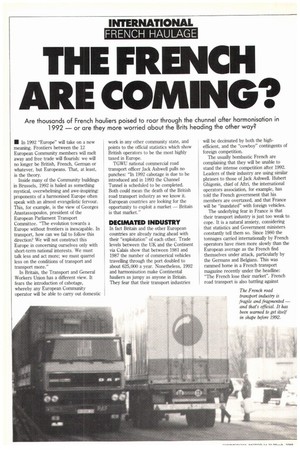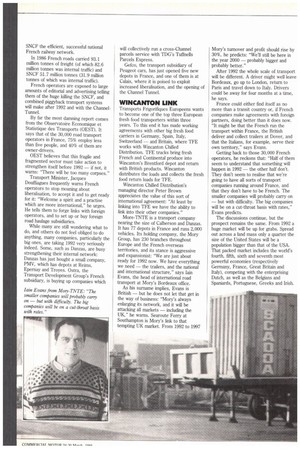THE FRENCH ARE COMING?
Page 68

Page 69

If you've noticed an error in this article please click here to report it so we can fix it.
Are thousands of French hauliers poised to roar through the chunnel after harmonisation in 1992 — or are they more worried about the Brits heading the other way?
• In 1992 "Europe" will take on a new meaning. Frontiers between the 12 European Community members will melt away and free trade will flourish: we will no longer be British, French, German or whatever, but Europeans. That, at least, is the theory.
Inside many of the Community buildings in Brussels, 1992 is hailed as something mystical, overwhelming and awe-inspiring: proponents of a harmonised Europe often speak with an almost evangelistic fervour. This, for example, is the view of Georges Anastassopoulos, president of the European Parliament Transport Committee. "The evolution towards a Europe without frontiers is inescapable. In transport, how can we fail to follow this direction? We will not construct this Europe in concerning ourselves only with short-term national interests. We must talk less and act more; we must quarrel less on the conditions of transport and transport more."
In Britain, the Transport and General Workers Union has a different view. It fears the introduction of cabotage, whereby any European Community operator will be able to carry out domestic work in any other community state, and points to the official statistics which show British operators to be the most highly taxed in Europe.
TGWU national commercial road transport officer Jack Ashwell pulls no punches: "In 1992 cabotage is due to be introduced and in 1993 the Channel Tunnel is scheduled to be completed. Both could mean the death of the British road transport industry as we know it. European countries are looking for the opportunity to exploit a market — Britain is that market."
DECIMATED INDUSTRY
In fact Britain and the other European countries are already racing ahead with their "exploitation" of each other. Trade levels between the UK and the Continent via Calais show that between 1981 and 1987 the number of commerical vehicles travelling through the port doubled to about 625,000 a year. Nonetheless, 1992 and harmonisation make Continental hauliers as jumpy as anyone in Britain. They fear that their transport industries will be decimated by both the highefficient, and the "cowboy" contingents of foreign competition.
The usually bombastic French are complaining that they will be unable to stand the intense competition after 1992. Leaders of their industry are using similar phrases to those of Jack Ashwell. Hubert Ghigonis, chief of Aftri, the international operators association, for example, has told the French government that his members are overtaxed, and that France will be "inundated" with foreign vehicles.
The underlying fear in France is that their transport industry is just too weak to cope. It is a natural anxiety, considering that statistics and Government ministers constantly tell them so. Since 1980 the tonnages carried internationally by French operators have risen more slowly than the European average as the French find themselves under attack, particularly by the Germans and Belgians. This was rammed home in a French transport magazine recently under the headline: "The French lose their market". French road transport is also battling against SNCF the efficient, successful national French railway network.
In 1986 French roads carried 93.1 million tonnes of freight (of which 82.6 million tonnes was internal traffic) and SNCF 51.7 million tonnes (31.9 million tonnes of which was internal traffic).
French operators are exposed to large amounts of editorial and advertising telling them of the huge killing the SNCF, and combined piggyback transport systems will make after 1992 and with the Channel! Tunnel.
By far the most damning report comes from the Observatoire Economique et Statistique des Transports (OEST). It says that of the 30,000 road transport operators in France, 75% employ less than five people, and 40% of them are owner-drivers.
OEST believes that this fragile and fragmented sector must take action to strengthen itself before 1992 — if not, it warns: "There will be too many corpses."
Transport Minister, Jacques Douffiagues frequently warns French operators to stop moaning about liberalisation, to accept it and to get ready for it: "Welcome a spirit and a practise which are more international," he urges. He tells them to forge links with foreign operators, and to set up or buy foreign road haulage subsidiaries.
While many are still wondering what to do, and others do not feel obliged to do anything, many companies, particularly the big ones, are taking 1992 very seriously indeed. Some, such as Danzas, are busy strengthening their internal network: Danzas has just bought a small company, PMV, which has depots at Reims, Epeniay and Troyes. Ostra, the Transport Development Group's French subsidiary, is buying up companies which will collectively run a cross-Channel parcels service with TDG's Tuffnells Parcels Express.
Gefco, the transport subsidiary of Peugeot cars, has just opened five new depots in France, and one of them is at Calais, where it is poised to exploit increased liberalisation, and the opening of the Channel Tunnel.
WINCANTON LINK
Transports Frigontiques Europeens wants to become one of the top three European fresh food transporters within three years. To this end it has made working agreements with other big fresh food carriers in Germany, Spain, Italy, Switzerland — and Britain, where TFE works with Wincanton Chilled Distribution. TFE trucks bring fresh French and Continental produce into Wincanton's Brentford depot and return with British products. Wincanton distributes the loads and collects the fresh food return loads for TFE.
Wincanton Chilled Distribution's managing director Peter Brown appreciates the value of this sort of international agreement: "At least by linking into TFE we have the ability to link into their other companies."
More-TNTE is a transport company nearing the size of Calberson and Danzas. It has 77 depots in France and runs 2,000 vehicles. Its holding company, the Mory Group, has 230 branches throughout Europe and the French overseas territories, and its stance is aggressive and expansionist: "We are just about ready for 1992 now. We have everything we need — the trailers, and the national and international structure," says lain Evans, the head of international road transport at Mory's Bordeaux office.
As his surname implies, Evans is British — but he does not let that get in the way of business: "Mory's always enlarging its network, and it will be attacking all markets — including the UK," he warns. Searoute Ferry at Southampton is Mory's link to that tempting UK market. From 1992 to 1997 Mory's turnover and profit should rise by 30%, he predicts: "We'll still be here in the year 2000 — probably bigger and probably better."
After 1992 the whole scale of transport will be different. A driver might well leave Bordeaux, go up to London, return to Paris and travel down to Italy. Drivers could be away for four months at a time, he says.
France could either find itself as no more than a transit country or, if French companies make agreements with foreign partners, doing better than it does now. "It might be that the French nm the transport within France, the British deliver and collect trailers at Dover, and that the Italians, for example, serve their own territory," says Evans.
Getting back to those 30,000 French operators, he reckons that: "Half of them seem to understand that something will happen in 1992 — the other half don't. They don't seem to realise that we're going to have all sorts of transport companies running around France, and that they don't have to be French. The smaller companies will probably carry on — but with difficulty. The big companies will be on a cut-throat basis with rates," Evans predicts.
The discussions continue, but the prospect remains the same. From 1992 a huge market will be up for grabs. Spread out across a land mass only a quarter the size of the United States will be a population bigger than that of the USA. That packed market includes the world's fourth, fifth, sixth and seventh most powerful economies (respectively Germany, France, Great Britain and Italy), competing with the enterprising Dutch, as well as the Belgians and Spaniards, Portuguese, Greeks and Irish.
















































































































